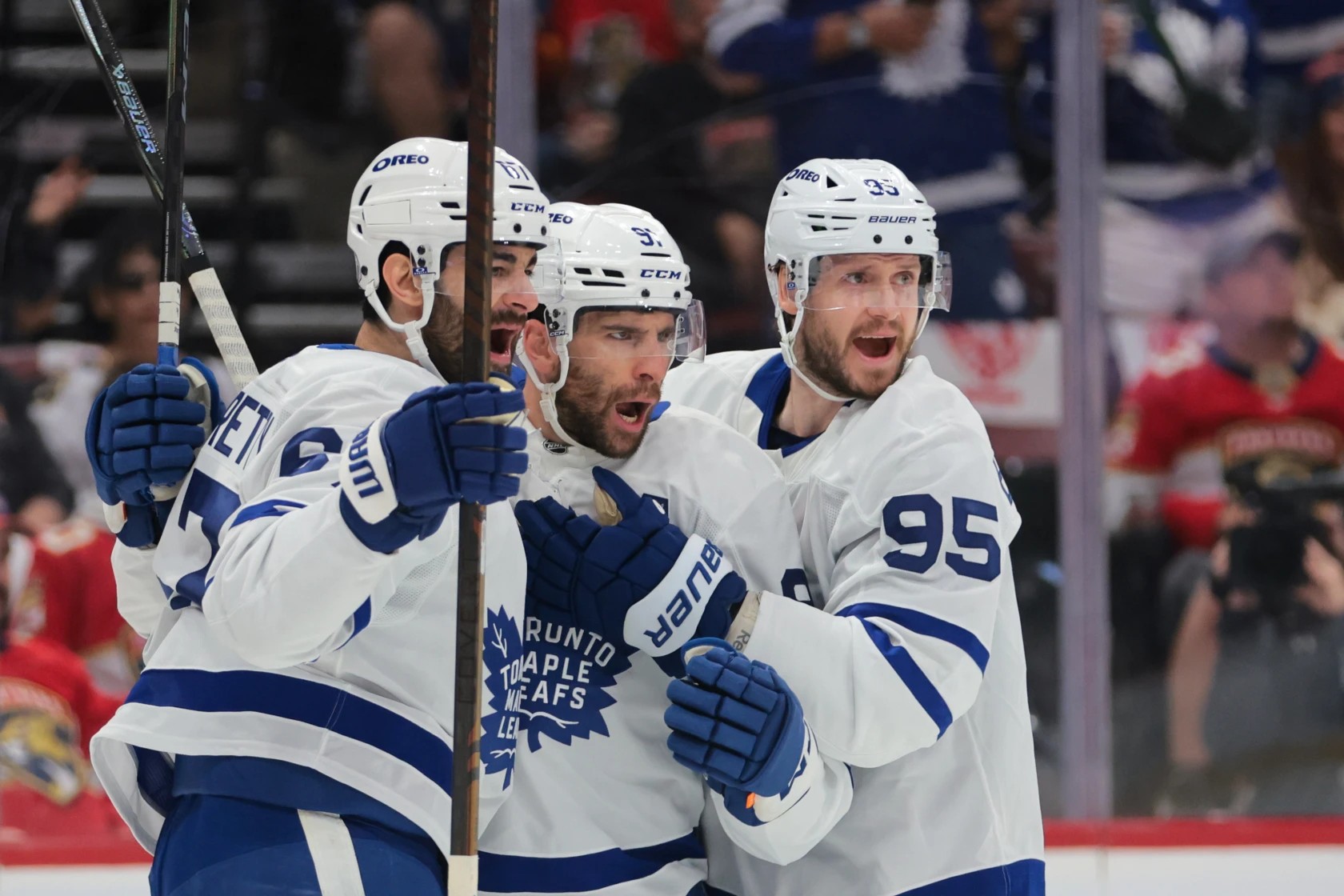The Florida Panthers are on the board in the series.
After getting off to another sluggish start in Game 3, Florida scored two quick goals in the second period to tie the game three apiece, before taking the lead on a very soft goal. The Maple Leafs were resilient to battle back and tie it in the third, and although both teams had chances in the overtime period, the Panthers won the game on a strange bounce (one of many in the game) during a long, tired shift for the Leafs‘ second line. The Maple Leafs still lead 2-1 in the series, but after losing a winnable Game 3, the importance of Game 4 and earning the split in Sunrise ratchets up:
Notable Performances from Game 3
John Tavares led the way for the Leafs in Game 3 offensively, notching his first two goals of the series. He cashed in a beautiful wrap-around finish after receiving a pass from Max Pacioretty off a 3v2 rush for the Leafs‘ second goal in the first period. Then, in the next period, Tavares deflected a point shot by Sergei Bobrovsky on the power play for an important breakthrough goal, the Leafs’ top unit’s first of the series.
Tavares made his mark offensively for the first time in the series, but he and his line were on the wrong end of two goals defensively; that includes Florida’s game-tying third goal, where a tired Marner was still on the ice with Tavares and Pacioretty, and Marner bailed on his puck support. Still, Tavares and Benoit combined to lose a puck battle to Matthew Tkachuk on the wall with numbers in their favour. William Nylander‘s run of dominance ended at three games with a quiet Game 3, picking up two more assists but not making the same shift-to-shift impact he did in the prior three games. None of it would’ve mattered if he converted when he had the game (and a 3-0 series lead) on his stick on a breakaway in overtime, but he could not solve Bobrovsky.
The shifting matchups as the series flipped to the road made the Tavares lines’ lives more difficult. The Leafs’ second line shared the ice with the Barkov line for around ~11 minutes at five-on-five and were out-shot 8-2 in those minutes (shot attempts were 12-3 for Florida). Pacioretty-Tavares will need more play-driving help from the puck-dominant Nylander if they’re going to turn the tables in Game 4.
The top line’s first shift of the night off the opening faceoff was exactly the tone-setting start on the road the team was dreaming up before the game. It ended in a goal for Matthew Knies to open the scoring, and they helped create the game-tying third-period goal scored by Morgan Rielly. Auston Matthews and Mitch Marner both collected two assists on the night for their roles in those goals, as well as the Tavares power play goal, but they gave some of it back. A tired Marner was culpable on the aforementioned third Florida goal, and the line was out for Barkov’s first goal, although a series of bad bounces — off a referee initially on Rielly’s rim attempt, on Matthews’ chip-out on the wall, and then off Rielly’s stick for the goal — was ultimately what put the puck in the net more than anything else.
The top line saw much more of Anton Lundell’s line on the road than the more hard-match scenario against the Barkov line at home, and while they edged those minutes against the Florida third line at five-on-five, whether it was enough to make Maurice rethink the approach in Game 4 remains to be seen. The Leafs are still looking for a signature Matthews game in this series/playoff, and when Lundell is Matthews’ primary matchup, he has to find a way to break through with goal production (more on that later).
There was a sharp disparity in usage between Toronto’s top six and bottom six, as the high-scoring nature of the game and the vulnerability of last change led Craig Berube to hide his depth forwards. Pontus Holmberg shared top-six duties with Pacioretty (Holmberg leaned on more later in the game), with both playing over 15 minutes, a mark Calle Järnkrok also matched, while none of Toronto’s bottom four forwards played more than ~13 minutes. Max Domi and Bobby McMann were out-chanced and out-shot heavily while not producing much offensively. They conceded the 3-2 goal that started the Florida comeback after a string of Leaf icings (one by Domi) and a lost puck battle on the wall by McMann vs. Aaron Ekblad. The Leafs need more from the bottom end of their forward group in Game 4.
On defense, a combination of bad bounces, iffy goaltending, and a few defensive miscues did the Maple Leafs in on a night where their offense again produced enough to win. The Morgan Rielly/Brandon Carlo pair were on ice for three goals against; two goals bounced in off of Rielly, and the other featured Carlo on his knees in the crease attempting to play a puck with a broken stick before it eventually trickled in. There was a lot of bad luck in there, but Carlo also committed an avoidable icing to help Florida get their second-period comeback started with the 3-2 goal against a tired Leafs unit.
Jake McCabe and Chris Tanev shouldered a heavy workload as always and did their job. Tanev missed a small chunk of the game after going to the locker room — which is a concern to monitor — but again, the two played among the most minutes on the Leafs’ defense and were not on ice for a goal against. Oliver Ekman-Larsson and Simon Benoit were okay, on ice for the other two goals that Florida scored, although one falls almost entirely on Joseph Woll‘s shoulders; the other one was the aforementioned Verhaeghe goal after Marner bailed, Benoit+Tavares lost a battle, and OEL was unable to take away the pass on the 2v1.
Storylines for Game 4
1. The Leafs’ hot starts. It was assumed that Florida would get off to a rip-roaring start in a pseudo “must-win” situation in Game 3, with the home crowd’s energy behind them. Instead, the Leafs bludgeoned Florida out of the gate, grabbing a 1-0 lead on the opening shift and increasing it to 2-0 before long. The Leafs owned the territorial battle in addition to scoring, tilting the ice against the Panthers and putting Florida on their heels to establish control of the game. It ultimately did not hold up, but it’s a formula to be replicated in terms of the start.
The hot start to Game 3 was the second time this series that the Leafs jumped out with a bang, following Game 1 when William Nylander scored in the opening minute. The Leafs also led that one 2-0 and eventually 4-1, so it is twice in three games that they have started in emphatic fashion. Florida did score first in Game 2 and were better to start that game, but even in that one, they weren’t as dominant as the Leafs’ opening sequences were in Game 1 and Game 3.
Who will seize control of the game from the opening faceoff in Game 4? The Leafs have made Florida chase games in this series more often than not, and it is a productive formula for Toronto, pushing the Panthers outside of their comfort zone and opening up their ability to hit Florida on the counter.
2. Shaky Joseph Woll. Since entering the series after the injury to Anthony Stolarz, Joseph Woll has had his moments in the Leafs’ net, but he has not lived up to the level of goaltending the Maple Leafs received most of the season. In the three games so far, Woll has allowed three goals (in 29.5 minutes), three goals, and five goals. His save percentage in those games: .850, .893, .861.
It’s not all on Woll; as we saw in Game 3, there have been some rough bounces, and pucks going wide or blocked in front that pinballed into the net. At the same time, Woll hasn’t made too many big, timely saves (toe save on Mackie Samoskevich in the third period of Game 2 aside), and he’s given up multiple shaky goals. Barkov’s power-play goal in Game 2 should have been stopped, and it went right through Woll. The Gadjovich goal in Game 3 was a back-breaker in the final five minutes of a second period the Leafs needed to get out of at 3-3; there was a slight deflection after the shot left Tomáš Nosek’s stick, but again, a puck went through Woll on a save he should have made.
Those types of goals clearly cannot happen on a nightly basis for the remainder of the series if the Leafs want to pull off the perceived upset. It helps that Sergei Bobrovsky hasn’t been particularly sharp in the other net, but it’s fair to expect Bobrovsky to make his mark at some point in this series with a signature Bob game. Woll needs to step up with a big game at some point, too, and it’s something we know he’s capable of. Woll is a career .910 goalie in the regular season, and his playoff numbers in 2023 and 2024 were even stronger.
3. Goal-less Auston Matthews. The subdued offensive play of Matthews has really become the biggest narrative surrounding the Core Four right now. Marner has a goal and four points in the three games, Nylander has three goals and six points, and Tavares scored twice in Game 3. Matthews, by comparison, has zero goals and three points in the series. We all know he has been excellent defensively, so much so that Maurice switched the plan to match Barkov against a different line during the series’ first home game for the Panthers. But Matthews is not paid one of the highest salaries in the NHL to be Philip Danault. He is paid to be a dominant matchup centerman who plays strong defense and also scores big goals in large quantities.
Extend his playoff sample back to the 2023 Florida series (Florida->Boston->Ottawa->Florida), and Matthews has three goals in 19 playoff appearances while shooting 3.8%. The drought is especially puzzling when we consider the Florida-specific angle. Matthews was held goal-less by Florida in the 2023 series, meaning it’s now been eight playoff games against the Cats without a Matthews goal. He also did not score a goal in three regular-season contests against Florida, so we have to go back to April 2024 to find his last goal against the Panthers (he scored twice in that game). That was the only time he scored in four contests vs. the Panthers in the 2023-24 season, so Matthews has scored in just one of the last 15 games played (regular season or playoffs) against Florida.
Most concerning is Matthews’ recent inability to hit the net. He now leads the NHL playoffs in most shot attempts off target; this is now bordering on “the yips.” The Leafs’ captain will need to find the cure quickly because the team will likely need at least one big Matthews game at some point to win this series.
4. The matchup game in South Florida. Maurice gained the luxury of last change on home ice and switched the Anton Lundell-led third line to face more of Auston Matthews’ line, freeing up Barkov’s line to face a different set of matchups, including more of the Tavares unit. Barkov’s goal came against the Matthews line, and Reinhart’s goal came against the Leafs’ fourth line after a couple of icings, but in Game 3, Barkov’s five-on-five shot attempt share head-to-head against Matthews was 50% compared to 82% away from #34.
The Lundell line was not punished by the Matthews line as much as it probably needed to be to make Maurice regret switching those matchups. With the success Barkov’s group had away from Matthews, Craig Berube can probably expect more of the same in Game 3.
The Leafs will need to adjust some and recalibrate their defensive usage to account for the matchup game. They also may have a liability on their hands with the fourth line, which wasn’t trusted much in Game 3. That’s not a big surprise given what we saw against Ottawa at points, but the Leafs had seemed to have all four lines humming to begin this series. A better bottom-six showing would go a long way, as there is only so much Berube can control on the road, and the Leafs largely went down to three lines late in a game that stretched well into a fourth period (not ideal).
5. A swing moment in the series. In a seven-game series, you can argue that any game after the first one is a pivotal “swing” moment, but this Game 4 feels especially huge. If the Leafs can prevail, they will have earned their desired split on the road and will return to Scotiabank Arena with a 3-1 series lead, the overwhelming favourites to win the series. If the Panthers hold serve at home, the Cup champs can take a big breath and feel like momentum is back on their side heading to Toronto.
From a Leafs perspective, there are lots of reasons to still feel optimistic. Big picture, if they were offered a 2-1 series lead through three games, nearly all fans of the blue and white would have jumped at it. The Panthers won Game 3, but the Leafs started the game brilliantly on the road, and Florida needed some flukey bounces and a howler past Woll just to squeak out an OT win. The Leafs are repeatedly exploiting Florida in transition while making them chase the game, and they won the special teams battle in Game 3 for the first time in the series. There are plenty of reasons to remain confident.
On the flip side, the Panthers will have some degree of confidence restored after winning their first game in the series. They can also take satisfaction in knowing that the Leafs scored four more times and held two separate two-goal leads but didn’t win. They’ll likely feel that they are well overdue to keep a game below three goals against, given Bobrovsky’s playoff track record and their M.O. as one of the stingiest teams in the league. Game 3 was a missed opportunity for Toronto to put this series in a vice grip, and perhaps the Panthers can feed on the energy to flip the series on its head.
The Panthers hope to turn their OT winner into some momentum within the series, while the Maple Leafs hope to snuff that out before it starts and earn their split. Which will win out in Game 4?













![John Gruden after the Leafs prospects’ 4-1 win over Montreal: “[Vyacheslav Peksa] looked really comfortable in the net… We wouldn’t have won without him” John Gruden, head coach of the Toronto Marlies](https://mapleleafshotstove.com/wp-content/uploads/2025/09/gruden-post-game-sep-14-218x150.jpg)


















